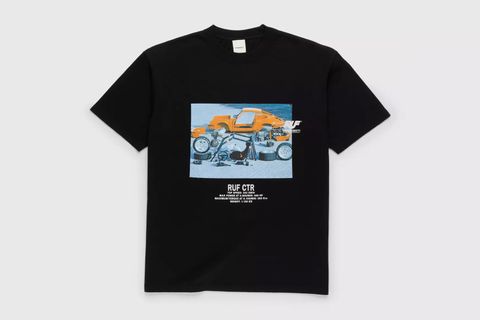RUF Isn't a Typical Car Manufacturer, It's An Auto Artisan
It’s an image that’s now iconic. On the cover of the July 1987 Road & Track magazine, the “blütengelb” yellow body of RUF Automobile’s new CTR model stands proudly in the middle of a track while a Lamborghini Countach, Ferrari GTO, Porsche 959, Isdera Imperator 108i, and more of the greatest production cars of the time surround it promoting their test to determine which is the fastest.
It was there that the world found out just how fast the RUF CTR is, including the head of its company Alois Ruf Jr. who had presided over it being built in the family’s small Bavarian garage but had only driven it on the journey to where the magazine was running its test.
“That car paved the way to where RUF is now,” Aloisa Ruf says, the third generation of her family to work for the automotive company.
On that rainy day at Volkswagen's Ehra-Lessien test track, the CTR became the fastest production car in the world, beating the most resource-rich car manufacturers and tuners in Europe with its highly modified bi-turbo engine and pressure-sensitive electronic control system. It was also on this day that the CTR received its nickname ‘Yellowbird.’
The CTR was the first car to carry the RUF name, created from a body in white (an unmarked rolling chassis) from a G-Series Porsche 911 Carrera to appease collectors who were disgruntled at Porsche announcing it would be discontinuing the model. While the company had already become renowned for its Porsche tuning and restorations, this was the first car it had made as a full-fledged manufacturer and it broke the record for being the fastest production car… twice, actually, with its final top speed clocking in at 213 MPH.
35 years later, the company is still producing blisteringly fast cars skinned in familiar Porsche silhouetted shapes at its base in Pfaffenhausen. And they retain the feeling of raw speed that you got from the CTR, with gaps in traction between gear shifts keeping the driver honest. If you’ve seen the viral video Faszination on the Nürburgring, you will have some idea what that looks like.
"When you're driving a RUF car, it's very raw and you need to be a good driver. When you press the clutch and you downshift or upshift, you become at one with a car," Aloisa says. "When you hear the turbos and the whistling, it's a sensation that is inexplainable because it's so raw."
What began as a service station founded by her grandfather Alois Ruf Sr. in 1939 has since evolved into an exclusive specialty car manufacturer that trades in untamed speed, ingenuity, and craftsmanship. Everything that it makes comes out of its base in Pfaffenhausen, which recently expanded to having 90 employees each with a particular, but deep expertise in the art of car making.
For our collaboration with the company, Aloisa not only gave us an insider look at the garage but shared an intimate photo essay. A keen photographer as well as being a designer and artist, it gives a behind-the-scenes view into the car company.
While the Ruf models may look like familiar Porsche silhouettes, don’t call them a tuner. Each car is hand built by artisans, and upon completion, receives a unique Ruf VIN and Serial number. But it’s what's underneath that defines the RUF experience, unbound by the constraints imposed on an industrial production line, its ambition in motion.
"In modern cars, very often there are so many computers and they do the thinking for you," Aloisa explains. "I admire the amount of work that goes into the development of creating these computers, but at the same time, when you get used to it, I feel like you lose the essence of driving."
This dedication to the ultimate driving experience continues to be the beating heart of RUF. In its early days, the chassis came directly from Porsche but starting with the CTR Anniversary, unveiled at the Geneva Motor Show in 2017, RUF created its own custom chassis for the first time — recreating the spirit of the original CTR whilst welcoming a new era for the company.
"It's a rocket," Aloisa says of the model after effortlessly reciting all of its specs. "What's so beautiful about it is that it's like a wolf in sheep's clothing, you would never expect it to be so wild. It gives you the sensation of seeing a beautiful old Porsche, but it isn't, it was completely developed in-house."
Eschewing large-scale production in favor of an artisanal approach to car manufacturing, all the RUF cars are limited. But an original CTR made from a body in white is especially hard to find, with only 29 ever produced. This new-and-improved version recreates the spirit (and yellow paintwork) of the original with a lightweight carbon fiber body that lets it deliver almost one horsepower per kilogram with a top speed of 224 MPH.
It is one out of the handful of cars that RUF has on offer, which range from the CTR 3 Clubsport and its state-of-the-art engineering to the RCT which has accompanied RUF through its last 20 years in production. And in our conversation, Aloisa makes it clear she knows each one inside out.
With her custom 1968 Porsche 912 (or Bertha, as she calls it) in tow, the 20-year-old is the newest generation of her family to enter the business. Having grown up around the workshop like her father before her, she remains tight-lipped about the prospect of eventually running the company but has certainly inherited the same obsession for car design and for nail-biting speed.
“I realized how spoiled I was when I started testing a variety of different cars not from RUF,” she says. “The legacy that my father has been carrying, that authenticity that he puts into every car is so rare and that's when I realized, ‘Wow, he is a genius.’”
The RUF Automobile x Highsnobiety collection will be available at the Highsnobiety Shop from August 10.








